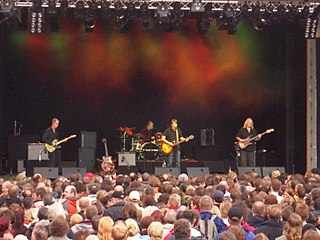
Ralph Christian Möbius, known professionally as Rio Reiser, was a German musician and the singer of rock group Ton Steine Scherben. He supported squatting in the early 1970s and later the green political party Die Grünen. After the German reunification, he joined the Party of Democratic Socialism.

Ton Steine Scherben was one of the first and most influential German language rock bands of the 1970s and early 1980s. Well known for the highly political and emotional lyrics of vocalist Rio Reiser, they became a musical mouthpiece of new left movements, such as the squatting movement, during that time in Germany and their hometown of West Berlin in particular. Today, after the band's demise in 1985, and the death of Rio Reiser in 1996, Ton Steine Scherben have retained a cult following and popularity in the related scenes. Recently, some of the remaining members have given reunion concerts.

Fettes Brot is a German hip hop group that formed in 1992.

Judith Holfelder-Roy, known by her stage name Judith Holofernes, is a German singer, guitarist, songwriter and author.

Böhse Onkelz, sensational spelling of böse Onkel is a German rock band formed in Frankfurt in 1980. The band reunited in 2014. Despite mass-media criticism concerning their past as skinheads, several of their later records topped the German album charts. E.I.N.S. was their most successful album, with over 510,000 copies sold.

Samsas Traum is a German rock band fronted by Alexander Kaschte. Their music consists of elements of symphonic metal, Neue Deutsche Härte, black metal and cantastoria. The name is derived from the protagonist Gregor Samsa in Kafka's The Metamorphosis (1915).

Ireen Sheer is a German-English singer. She had a top five hit on the German singles chart with "Goodbye Mama" in 1973. She went on to finish fourth at the Eurovision Song Contest 1974 representing Luxembourg, sixth at the Eurovision Song Contest 1978 representing Germany, and thirteenth at the Eurovision Song Contest 1985 representing Luxembourg again.

Preußens Gloria, Armeemarschsammlung II, 240, is a well-known military march of the 19th century, composed by Johann Gottfried Piefke (1817–1884).

Element of Crime is a German rock band that plays melancholic chanson, pop and rock music with guitar, bass guitar, drums and voice/trumpet.
This following is a list of the work released by German rock band Ton Steine Scherben. It is currently missing the (few) singles issued by the band.

The Rauch-Haus-Song is a track performed by West Berlin band Ton Steine Scherben on their second studio album Keine Macht für Niemand. It has become famous in leftwing circles in Germany.

In Deutschland is a 1965 album by the French pop singer Françoise Hardy. It was her first German-language album released in Germany in September 1965, on LP, Bellaphon/Disques Vogue. The 12 songs of this album have been reissued on CD entitled Frag' den Abendwind, in 2001, on RCA/BMG.

Warum geht es mir so dreckig? is the first album released by the German rock band Ton Steine Scherben. It includes—among other pieces—the song Macht kaputt, was euch kaputt macht, which expressed the built-up anger and radicalization of the youth of the late 1960s and early 1970s.

Keine Macht für Niemand is the name of both the second album and best-known song by the German rock band Ton Steine Scherben. The double album, released in 1972, is also sometimes called “die Weiße” in reference to its simple cover with a white background and black text.

Wenn die Nacht am tiefsten… is the third album released by Ton Steine Scherben, and is the last one released before their six-year break from recording. It shows the first signs of a change in genre: moving away from Macht kaputt, was euch kaputt macht towards Halt dich an deiner Liebe fest.
Lukas Loules is a German songwriter, composer, music producer, and singer. In 2014, he married Katerina Loules and changed his surname from Hilbert to Loules.
The "Einheitsfrontlied" is one of the most famous songs of the German labour movement. It was written by Bertolt Brecht and composed by Hanns Eisler. The best-known rendition was sung by Ernst Busch.
"Macht kaputt, was euch kaputt macht" is a 1970 song by German proto-punk band Ton Steine Scherben and a subsequent political slogan. Written in 1969, it first appeared as a single the next year, followed by the band's 1971 debut album Warum geht es mir so dreckig? The slogan was subsequently used in the German autonomous, squatting, and contemporary anarchist outgrowths of the 1960s West German student movement.
"Tage wie diese", is a song by the German punk-rock band Die Toten Hosen. It was released on 23 March 2012 as a single, being a teaser for the album Ballast der Republik that was released afterwards on 4 May 2012.














